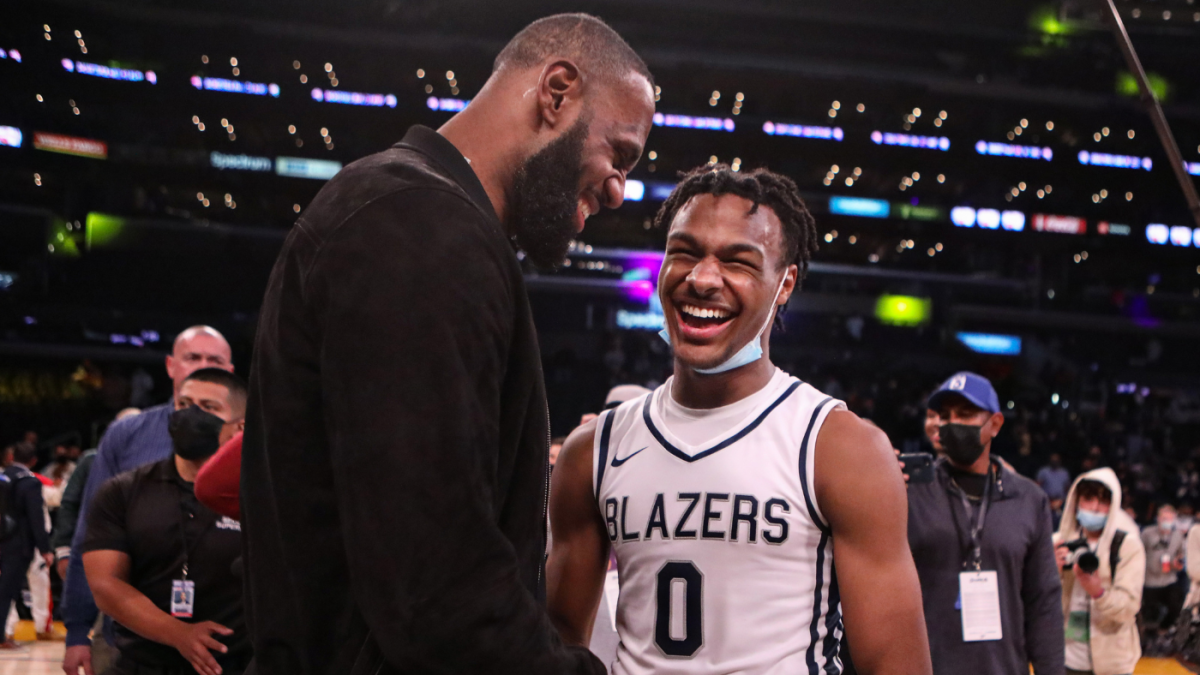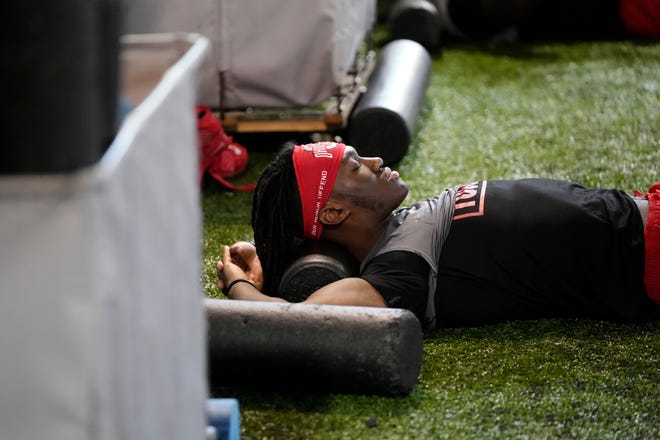Table of Contents
LeBron James Sr. was the top-ranked NBA prospect in his class from practically the moment he could pick up a basketball. He was a prodigy identified as a future superstar years before he was eligible to become a professional and about as close to a sure thing as young athletes ever get. LeBron James Jr., on the other hand, is something a bit more conventional.
Midway through his junior season at Los Angeles powerhouse Sierra Canyon, 247Sports ranks James as the 34th-best player in his high school class. His standing as a prospect has slipped since he reached the high school level, as 247 ranked him No. 19 in the class of 2023 as recently as September 2020. Now? He’s not even the highest-ranked son of a former Cleveland Cavalier in that class, as the 2023 crop is headlined by DJ Wagner, son of LeBron’s former teammate DaJuan Wagner. A four-star ranking is nothing to sneeze at for most prospects. It’s fairly low for a prospect literally named “LeBron James.”
Were a prospect of that caliber not named “LeBron James,” he would probably be expected to spend multiple years in college developing his skill set and preparing to transition from collegiate star to professional role player. That might not be a luxury Bronny has, though, because his more famous father is already tying the end of his own career to the beginning of his son’s.
Please check the opt-in box to acknowledge that you would like to subscribe.
Thanks for signing up!
Keep an eye on your inbox.
Sorry!
There was an error processing your subscription.
“My last year will be played with my son,” James Sr. told The Athletic Saturday. “Wherever Bronny is at, that’s where I’ll be. I would do whatever it takes to play with my son for one year. It’s not about the money at that point.”
The elder James has not set a definitive timeline for the end of his career. His current Lakers contract expires in 2023. Barring a surprise change to the NBA’s one-and-done rule, his son won’t become eligible to be drafted until 2024 at the earliest. By that point, LeBron James Sr. will be nearing his 40th birthday. He’s probably not going to want to stick around much longer than that. Even if he does, every extra year he waits is one in which he could suffer an injury that prevents their teaming up. The odds therefore suggest that James Jr. will enter the NBA Draft in 2024 as a prospect who, on merits, would be unlikely to be selected in the first round.
And that’s where this gets interesting. The cynical view of LeBron’s declaration is that he is well aware of his son’s ranking as a prospect and is dangling the carrot of his own farewell tour as an enticement for some team to draft Bronny. If this is his plan, it’s a sound one. From a purely strategic standpoint, getting even one year out of a quadragenarian LeBron is well worth the investment of a single draft pick. In fact, James could probably turn his son, a fringe prospect at this moment, into one of the higher selections in the 2024 NBA Draft.
Last June, The Ringer’s Zach Kram measured the typical value of each slot in the NBA Draft lottery. What he found was that while almost every slot had produced great players, the median return on most picks was fairly underwhelming. Over the four-year duration of their rookie contracts, the No. 8 overall pick is expected to produce 6.8 wins above replacement using FiveThirtyEight’s WAR metric. Well … James has produced 6.6 wins above replacement by their standard this season alone. In just 41 games on a broken roster, James has produced roughly as much as the No. 8 overall pick would be expected to in the first four years of their career.
James should theoretically decline with each passing season, and in some ways, he already is. He’s averaging a career-low 5.6 free throw attempts per game, for instance, and a commensurate drop in drives per game suggests that his athletic decline is limiting how often he can attack the basket. Yet overall, James is scoring 29.1 points per game. That’s the third-most of his career. He’s made up for it by becoming a significantly better jump shooter and retaining his game-breaking passing ability. James probably won’t be able to point guard an elite offense in his 40s, but there’s little evidence suggesting he can’t be a significant part of one at that point.
Even a non-superstar version of James, earning below market value on what will likely be a minimum or mid-level contract, is worth a decent first-round pick based on what those picks tend to net on the trade market. While the days of Toronto giving up a No. 5 overall pick for a 34-year-old Charles Oakley are long gone, picks in the middle of the first round are dealt for non-stars somewhat frequently. Picks projected to come in at No. 18 (Derrick White) and No. 24 (Caris LeVert) were dealt for non-stars at the 2022 deadline. Go back a bit further and better picks have gone for far less. The 2017 Wizards dealt the pick that became Jarrett Allen for three months of Bojan Bogdanovic. Contenders somewhat frequently deal later first-round picks for one-year rentals. James would be perhaps the most valuable rental player in the history of basketball.
That value isn’t limited to what happens on the court. The economic impact of signing James is far greater. In 2018, SNY’s Ian Begley reported that one ownership group estimated that employing James would generate roughly $65 million annually for any team that signed him. The entire surrounding community feels that impact. One study estimated that James would create just below $400 million in value for the Los Angeles economy over five hypothetical seasons with the Lakers. Ticket prices and jersey sales soar. Bars and restaurants get packed. We live in an NBA world in which the Boston Celtics recently gave away the draft pick that became Desmond Bane just to shed Enes Kanter off their luxury tax bill. No matter what their general managers advise, there are going to be owners willing to give up better picks for the economic opportunities James creates.
Add all of this together and it almost doesn’t matter what kind of prospect James Jr. turns out to be. His draft stock will depend on just how high a pick some team is willing to spend on a year of his father’s services, and the longer James Sr. remains one of the very best players in the NBA, the higher that pick is going to end up being.





